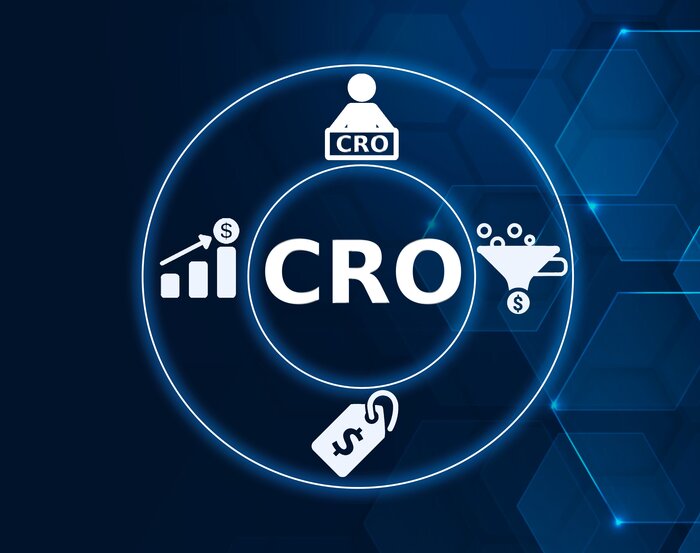What Is a Fractional Chief Revenue Officer (CRO)? Key Responsibilities
Discover what a fractional CRO (Chief Revenue Officer) is, how they differ from full-time CROs, and when to hire one. Also, explore the easiest way to hire one.
A 2023 McKinsey study found that Fortune 100 companies with a Chief Revenue Officer (CRO) or similar role reported 1.8 times higher revenue growth than those without such a position.
These executives align your marketing, sales, and customer service teams to optimize your sales strategy and maximize revenue generation.
But, not every company may be in a position to hire a full-time executive for this role.
The solution?
A fractional CRO.
A fractional CRO is a seasoned executive who performs all the duties of a full-time CRO but on a part-time basis – without the commitment of a full-time executive salary.
Let’s explore how fractional CROs differ from full-time CROs and when you should hire one. We'll also look at their key duties and the easiest way to hire one.
Further Reading:
- Looking to strengthen your financial strategy? Discover how a Fractional Chief Financial Officer (CFO) can be the game-changer your business needs.
- Explore why you should hire a Fractional Chief Marketing Officer (CMO) to transform your marketing roadmap.
How Does a Fractional CRO Differ From a Full-time and Interim CRO?

The best way to understand the concept of hiring a fractional CRO is to compare them against a full-time or interim hire. Here’s how they differ:
- A full-time CRO is a full time executive and member of the C-suite dedicated to overseeing and integrating all revenue generation processes within an organization.
- An interim CRO temporarily fills the leadership role, typically during periods of transition or while companies search for a permanent chief revenue officer. Their main focus is to maintain continuity in revenue-related activities and strategies, ensuring a seamless handover.
- A fractional CRO is a part-time executive who may handle a full-time CRO's duties or focus on targeted growth areas like sales process optimization and customer success improvements. They often work for multiple companies part-time.
So, the main difference between a fractional vs a full-time CRO is the time investment, which also makes them a more cost-effective hire — especially considering that, unlike full-time chief revenue officers they typically don't require bonuses, equity, or other perks.
Working with multiple companies also gives them a diverse experience and unbiased perspective.
The difference with an interim CRO is that a fractional CRO isn’t necessarily a temporary position. You may hire one for shorter projects — or even hire one as an interim CRO — but they may also provide your company with valuable insight for the long term.

- Go-To-Market Strategies & Implementation
- Fractional CRO
- Revenue Leader
- Business Development
Value Selling, Value Creation and GTM expert, Growth of ARR from $0-$50M in a complex SaaS industry, Founded and successfully exited consumer products company
When Should You Hire a Fractional CRO?

Hiring a fractional CRO could be a smart move for your business when:
- You are experiencing stagnant or declining sales and need fresh, strategic input to revitalize your revenue growth strategy.
- You lack the budget for a full-time CRO but recognize the need for expert guidance to refine your sales process and marketing strategies.
- You're expanding into new markets or launching new products and require specialized knowledge to navigate these challenges successfully.
- You find that your marketing team and sales team are working in silos, leading to inefficiencies and missed opportunities for cross-functional synergy.
- You need to establish or overhaul your sales processes and customer relationship management but lack the internal expertise to do so effectively.
- You're experiencing rapid growth and need to scale your sales and marketing efforts quickly without compromising on strategy or execution quality.
- You're preparing for a major event, such as seeking investment or aiming for acquisition, and need to demonstrate a strong, scalable revenue model.
If any of these situations apply to you, a fractional CRO could be key to transforming your business. Next, we'll examine how these fractional executives can make that happen.
12 Critical Responsibilities of a Fractional CRO

The strategic roles a fractional chief revenue officer plays will impact everything from your overall market positioning to revenue growth and competitive advantage.
Here’s what they bring to the table:
1. Develop and Execute Revenue Strategies
Your company may struggle to scale and optimize revenue operations due to inefficiencies in sales and marketing strategies.
A fractional CRO manages revenue strategy development by analyzing market trends and customer preferences and assessing the company’s strengths and weaknesses. They customize these strategies for different market segments, focusing on specific customer needs and opportunities to maximize growth.
For example, to target the small business segment, a CRO might develop a marketing strategy tailored to small business owners, highlighting the cost-efficiency and scalability of the company’s cloud services. This may include tailored content, special pricing, and dedicated support teams to engage this segment and drive conversions.
Such a well-crafted revenue strategy can maximize earnings from current customers, attract new customers, and efficiently manage costs.
In short, effective revenue management can potentially turbocharge your sustainable growth.

2. Streamline Sales and Marketing Processes
If your company cannot unify its sales and marketing efforts, it could lead to missed opportunities and inefficient resource use.
A fractional CRO plays a crucial role in sales management by identifying bottlenecks and redundancies in the sales and marketing processes.
They optimize marketing campaigns, sales strategy, and communication channels to improve operational efficiency. This drives conversions and revenue growth.
For example, a fractional sales manager might oversee the integration of CRM systems and marketing automation tools to facilitate better lead management and conversion tracking. This can boost ROI through sales process optimization and campaign improvements.

- Go-To-Market Strategies & Implementation
- Advisor
- Analytics
- Fractional CRO
B2B Saas | GTM | Scaled company from 5M to 50M ARR
3. Drive Market Entry and Expansion
Your organization may struggle with new market entry and expansion if you are unfamiliar with the market landscape, customer journey needs, and competitive dynamics.
A fractional CRO, with experience across various sectors and markets, identifies lucrative, untapped opportunities and tailors strategies to local demands.
For example, they could lead a company's expansion into the European market by analyzing consumer behavior, creating targeted marketing campaigns, and forming partnerships with regional retailers.
This approach boosts regional market presence and sustainable growth.

- Fractional CMO
- Go-To-Market Strategies & Implementation
- Marketing
- Strategic Partnerships
GTM Strategist | Strategic Partnerships & Alliances | ex- M12 (Microsoft's Venture Fund), ex- Smartsheet, ex- PitchBook
4. Enhance Customer Acquisition and Retention
If you rely on outdated strategies without proper market analysis, you may face stagnant customer growth and low customer retention rates.
A fractional CRO is adept at using advanced data analytics to precisely understand customer behaviors and market trends. They may optimize touch points across the sales process and use feedback to improve products and services, and the overall customer experience.
For example, a fractional CRO might deploy a sophisticated CRM system to segment customers based on purchasing patterns and then craft personalized email marketing campaigns. This can dramatically increase acquisitions and boost customer retention.
5. Oversee Strategic Sales and Forecasting
If you don't predict revenue accurately, you will not be able to coordinate sales efforts and market opportunities. This will lead to unachieved revenue targets and inefficient allocation of resources.
A fractional CRO will make your strategic sales plans proactive and responsive to market demands.
They also manage forecasting, employing advanced analytics to predict future revenue trends and potential market shifts.
For example, a fractional CRO might analyze seasonal sales data and market responses to decide the timing and budgeting of upcoming marketing campaigns. This ensures investments are targeted and timely to capitalize on current market interest.

- Fractional CRO
- VP Sales
- Advisor
- Software Sales
Sailing your startup ship to more revenue, FAST
6. Improve Customer Success and Satisfaction
Despite attracting customers, maintaining their loyalty can be challenging, potentially leading to high churn rates and an underperforming growth strategy.
A fractional CRO deeply understands customer needs and will fine-tune your products, services, and customer success strategies to match the customer journey.
They implement structured feedback systems, improve customer support channels, and tailor communication strategies to enhance engagement and customer experience.
For example, a fractional CRO at a tech firm could implement a feedback loop where data from customer service interactions is integrated into a centralized database. This is used to inform product updates and marketing strategies. This way, every customer interaction adds value leading to higher satisfaction and retention rates.

- Growth
- Product Strategy
- Go-To-Market Strategies & Implementation
- Product Management
Founder, builder & scaler: I've helped 6 startups generate successful exists
7. Foster Executive Collaboration and Alignment
If your company's executive teams are misaligned, you might encounter conflicting goals and disjointed strategies, which can disrupt decision-making and hinder business performance.
A fractional CRO facilitates collaboration so that all C-level executives agree with the revenue objectives. They implement structured communication processes and regular meetings to ensure all executives are on the same page.
For instance, they may initiate monthly strategy sessions with heads of sales, marketing, and operations to coordinate their strategies with market data and company revenue targets. These sessions clarify roles and bring in a much-needed strategic coherence.

- Fractional CRO
- Sales
- Executive Team
- Go to Market strategy
Early GTM leader at Tableau, Parallels, and Paxata; Founded EyeLevel and Eleventeen
8. Innovate Pricing Strategy and Monetization Models
If your pricing strategy and monetization models are outdated and don’t resonate with market demands, revenue growth can stagnate.
A fractional CRO may work with pricing specialists and market analysts to conduct pricing research and competitive analysis. They will evaluate critical factors such as product differentiation, perceived value, and willingness to pay to identify pricing opportunities and barriers.
For example, a fractional CRO at a consumer tech company might lead the development of a tiered pricing model targeting different customer segments. This aligns price points with market demand and enhances the perceived value of the products.

- People Operations
- Go To Market
- Sales
- Hiring
Growth-focused fractional COO helping CEOs and founding teams build and scale their companies
9. Leverage Data Analytics for Insights
If your company doesn’t use data analytics to understand consumer behavior and market demand, it will hinder your ability to make informed decisions.
A fractional CRO may integrate data from various business operations into a centralized system to interpret sales trends, customer behaviors, and market dynamics. They use predictive analytics to forecast future trends and make strategic decisions.
For instance, they may analyze conversion rates, customer acquisition costs, and ROI across online, in-store, and mobile sales channels. Using these insights, they reallocate resources to optimize profitable channels and streamline underperforming ones, significantly enhancing sales and operational efficiency.

- Go-To-Market Strategies & Implementation
- Advisor
- Analytics
- Fractional CRO
B2B Saas | GTM | Scaled company from 5M to 50M ARR
10. Optimize Technology Stacks
If your tech stack doesn't match your business needs or market requirements, it can drive up your costs and hinder your growth potential. For instance, you could be using an outdated CRM system that cannot integrate with newer e-commerce platforms.
A fractional CRO will identify any gaps, overlaps, or outdated technologies that are not efficiently serving your business. They make sure your sales, marketing, and customer success teams are equipped with the right tech stack that improves the flow of data among them.
For instance, they may integrate a new CRM system with marketing automation tools to improve lead tracking and customer engagement. This may be more efficient for the company’s current revenue operations and can also be scaled up with future growth.

- Fractional CRO
- Go-To-Market Strategies & Implementation
- Sales
- Go to Market strategy
Early-stage GTM Operator
11. Cultivate Brand Engagement across Digital Touchpoints
If your marketing team is unable to maintain a cohesive brand presence and consistently engage with customers across multiple digital platforms, it can dilute your brand impact and customer loyalty.
A fractional CRO employs deep expertise to streamline and align brand messaging across all digital channels. They map out key digital channels where the target audience is most active and tailor content and interactions to fit the platform and user expectations.
For example, in a specialty retail company, a fractional CRO might develop a unified messaging strategy personalizing interactions across social media, email, and mobile apps. This will boost customer engagement and strengthen the brand’s overall digital footprint, driving consumer loyalty and sales.
12. Recruit, Develop, and Retain Top Talent
Failure to attract and retain talent in key revenue-driving departments (sales, marketing, and customer success) can limit your ability to expand and meet financial targets.
Fractional CROs with a wealth of experience from various industries have a keen eye for identifying the finest sales and marketing talent. They may redesign the recruitment, onboarding, and offboarding processes to attract the right candidates.
They may introduce sales training programs (in strategic selling or digital marketing analytics, for instance), and establish clear performance metrics.
They also create effective rewards and compensation strategies, specifically for high-impact roles, including clear career progression paths.
All of this will equip your company with the expertise necessary to achieve your revenue goals.

- Team Building
- Advisor
- Leadership
- Product Strategy
Sales Leader, Strategic Advisor, Performance Coach
Now, how do you find the right fractional chief revenue officer for your company?
How to Hire the Right CRO and Set Them Up for Success

Follow these steps to identify and hire the ideal revenue officer for your business:
- Define your company's revenue goals clearly so that the fractional CRO’s expertise matches your business needs.
- Craft a detailed job description that outlines the specific responsibilities, required qualifications, and skills of a fractional CRO.
- Promote the job opening through various channels such as LinkedIn, industry-specific job boards, and professional networks.
- Screen initial applications by evaluating professional histories and qualifications, checking references, and reviewing past successes.
- Conduct interviews posing situational, behavioral, and technical questions that assess their problem-solving capabilities, adaptability, and strategic proficiency. Look for skills and experience like proven sales leadership, go-to-market strategy expertise, and so on, as well as soft skills like customer centricity and networking capabilities.
- Clarify role expectations, working hours, engagement length, and compensation during negotiations.
- Finalize the partnership with appropriate legal documents such as a Service Level Agreement (SLA) and Statement of Work (SoW).
- Welcome your fractional CRO with a thorough introduction to your business and marketing and sales team.
- Set specific Key Performance Indicators (KPIs) to measure the CRO's impact on revenue and strategic performance.
- Establish communication channels and routine reporting for transparency and progress tracking.
- Equip them with the necessary tools and data for strategic planning and execution.
- Schedule strategy reviews for ongoing performance analysis and tactical adjustments.
Feeling overwhelmed by these steps?
We'll introduce you to an easier way to find the right fractional executive.
The Most Effective Way to Hire a Fractional CRO: Go Fractional

Go Fractional is a fractional hiring platform that offers a top-notch network of CROs suitable for any business size.
Our fractional CROs bring extensive experience in revenue generation and strategy and have successfully guided companies through market expansions.
What are the benefits of leveraging our fractional CRO services?
- Hire top-quality fractional CROs at a fraction of the cost of a full time executive, with no equity hit, payroll taxes, healthcare premiums, paid leave, and so on.
- Explore the profiles of our network's existing members and provide us with your requirements. We will identify the right candidates for you to evaluate.
- Eliminate the need to wait for weeks or months to onboard your fractional executive — our CROs are ready to start within the week.
- Enjoy transparent rates for our fractional CRO services.
- Leave the administrative burdens of hiring, contract negotiation, and other admin tasks to us. And, you can focus on what matters most to you – your core business.
How Much Do Our CRO Services Cost?
The total cost can differ depending on the CRO's time involvement, level of expertise, and the intricacy of your financial circumstances. But, the typical monthly salary for a seasoned CRO typically ranges from $10,000 to $20,000 (120,000 to 240,000 annually).
This is a steal considering full-time CROs are paid up to $410,000 per year, including benefits.
Undoubtedly, going fractional is a very effective route to working with a successful chief revenue officer.
Connect with Go Fractional today to take advantage of our professional CRO services.
